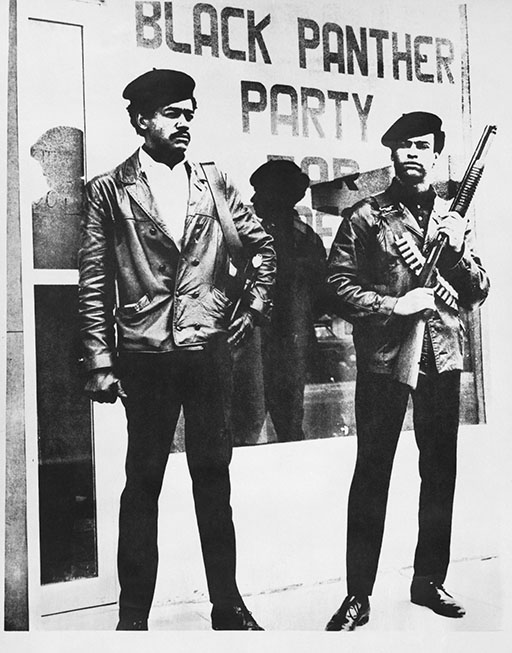10 The Black Panthers
In 1966, a new black rights movement known as the Black Panthers was established by Huey P. Newton and Bobby Seale in Oakland, California. Initially known as the ‘Black Panther Party for Self-Defense’, the organisation explicitly differentiated itself from the non-violent civil rights groups, and its members styled themselves deliberately along the lines of contemporary anti-colonial revolutionaries in Africa and Latin America. The Black Panthers’ primary goals and philosophies are evident in the party’s ‘Ten-Point Program’, first published in 1966.
Activity 5
Read this extract from the ‘Ten-Point Program’ before answering the questions below:
‘We believe that Black People will not be free until we are able to determine our own destiny …
We believe that the federal government is responsible and obligated to give every man employment or a guaranteed income. We believe that if the White American businessmen will not give full employment, the means of production should be taken from the businessmen and placed in the community so that the people of the community can organize and employ all of its people and give a high standard of living. …
We believe that if the White landlords will not give decent housing to our Black community, then the housing and the land should be made into cooperatives so that our community, with government aid, can build and make a decent housing for its people. …
We believe we can end police brutality in our Black community by organizing Black self-defense groups that are dedicated to defending our Black community from racist police oppression and brutality. The Second Amendment to the Constitution of the United States gives the right to bear arms. We therefore believe that all Black people should arm themselves for self-defense’.
- To what extent does this strike you as a ‘revolutionary’ document?
- In what ways do the Black Panthers’ beliefs differ from those of the civil rights activists of the early 1960s?
Discussion
In many respects, this is a revolutionary document which makes radical demands. Some of the points, in fact, explicitly use the language of Marxism. For example, the Black Panthers propose seizing ‘the means of production’ and advocate the redistribution of land and housing amongst the black community.
The Black Panthers’ beliefs differ considerably from those of civil rights leaders like Martin Luther King Jr. Whereas King emphasised integration and non-violence, the Black Panthers proposed a black separatist vision in which Black people ‘are free to determine our own destiny’. In this sense, their views were similar to those of Malcolm X. Perhaps most significantly, the Black Panthers differ from groups like the SCLC and SNCC in their willingness to use violence. They highlight their right to bear arms and their desire to retaliate in the face of police brutality.
In the context of the Cold War, this approach made the Panthers appear to be much closer to left-wing revolutionaries in other parts of the Americas, such as Fidel Castro in Cuba. Their style of revolution appeared rather different – and considerably more dangerous – from that of the early civil rights movement. As Alex Zamalin has argued, many ‘White liberals … shook with horror at the scenes of armed Black men in paramilitary gear walking the streets of Oakland’ (Zamalin, 2017, p. 88).

The Black Panther party was initially popular, spreading swiftly across the country and establishing new chapters in major American cities. The organisation worked in inner city ‘ghettos’, providing free meals and classes for local children, but it was also involved in violent clashes with the police. A number of members were charged with murder and arrested for criminal activities. Despite being deemed by J. Edgar Hoover, the Director of the FBI, as ‘the greatest threat to the internal security of the country’ (quoted in Murch, 2010, p. 184) in 1969, the Black Panther Party was only ever a fringe movement, and its influence began to wane after 1970, before the organisation could successfully implement its revolutionary goals.
